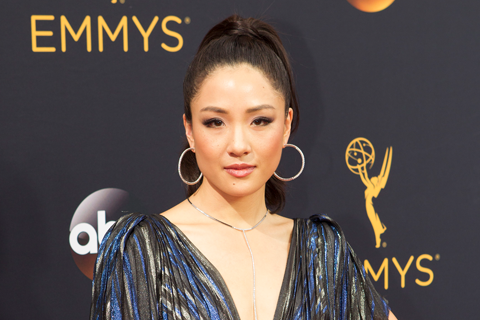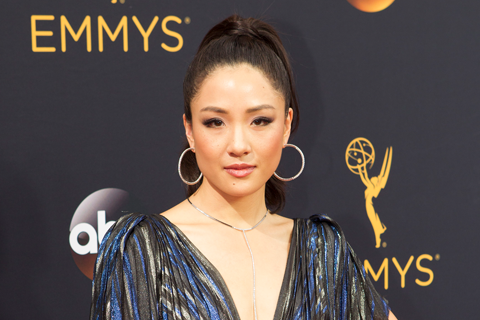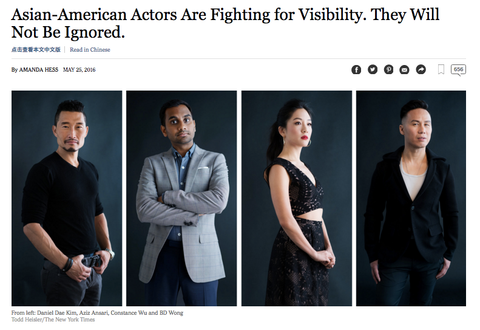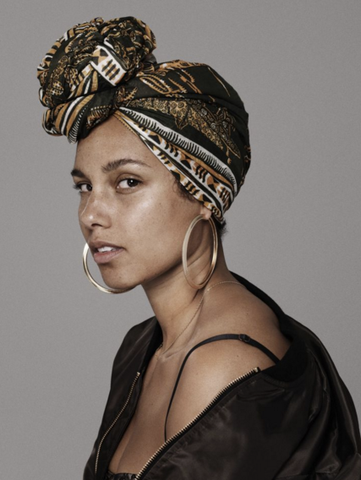THE POP CULTURE RAG VOL. 7
thinx archive
·5 min read

by Team Thinx | 05/31/2016
CONSTANCE WU FIGHTS FOR ASIAN VISIBILITY IN HOLLYWOOD
Recently, Fresh Off the Boat star Constance Wu has been vocal about the lack of Asian visibility in the entertainment industry, and now she’s taking her concerns to the NYT.

Constance Wu (ABC/Rick Rowell)
When images of Scarlett Johansson (erm, white) were released for the upcoming film adaptation of the Japanese series Ghost In The Shell, Wu took to Twitter to express her disappointment and concern over Hollywood’s never-ending stream of whitewashing. Now, along with actors Daniel Dae Kim, Aziz Ansari, and BD Wong, she is speaking to the New York Times about the lack of Asian visibility in American film, and the struggle to compete against white actors for the same roles.

“An Asian person who is competing against white people, for an audience of white people, has to train for that opportunity like it’s the Olympics,” Wu told The New York Times. “An incredibly talented Asian actor might be considered for a leading role maybe once or twice in a lifetime. That’s a highly pressured situation.”
Wu also explained that she had not initially realized the importance of her role on FOTB, the first show to feature a predominantly Asian cast in 20 years. However, once she started filming and received feedback and support from fans, she understood the significance. “It changed me,” Wu told the NYT. Now, she not only wants to create more space in the entertainment industry for herself, but for the Asian-American community at large.
Major snaps for Wu, a woman who is not only crushin’ it on her own show but paving the way for other Asian-American actors, too.
RASHIDA JONES EXPLAINS FEMINISM TO STEPHEN COLBERT
Team THINX’s wanna-be best friend (beautiful tropical fish, etc., etc.), Rashida Jones explained to Stephen Colbert what feminism is this week, and ya girl nailed it.
Jones, who just spoke at Harvard University, her alma mater, dropped by The Late Show to give a ‘lil lesson on equality to Colbert and his audience.
“I think people equate with being a man hater, and it’s not that, it’s just about gender equality, and I think until we have actual equality between men and women it’s going to exist.” Rashida’s response was met with applause from the audience. “Yeah! Be proud to be a feminist!” Jones told the audience.
“Do you know what to do to be a feminist?” Jones asked Colbert. When Colbert asked for tips, she explained, “Well, you just have to stay educated and stay sensitive.. You have to know what we go through. There’s a lot of, kind of inherent sexism when you’re an actress and you’re interviewed, whether it’s on a red carpet or about a movie or whatever.”

Jones then asked Colbert questions that a women would typically be asked in an interview, such as “Who are you wearing?”, “What’s your beauty regimen?”, and “With three kids at home, how do you do it all? Women want to know!” Ya know, the same three questions that are asked of successful actresses in basically every interview they do.
After some shaky answers filled with lots o’ laughs, Jones gave Colbert a passing grade, saying “You answered all those questions right, unlike a woman. There’s no right answer for a woman.”
Watch all of Jones’s feminist breakdown below!
ALICIA KEYS DEBUTS HER FAVORITE LOOK YET
Alicia Keys penned a piece for Lena Dunham’s “Lenny Letter” this week called “Time To Uncover,” within which she unpacked quite a bit about body acceptance and positivity. We mayyyy have cried.
Keys describes the process of creating her new album (to be released this summer), and the honesty and transparency she wanted to incorporate into her work. “I wrote a list of all the things that I was sick of,” she wrote, “ And one was how much women are brainwashed into feeling like we have to be skinny, or sexy, or desirable, or perfect. One of the many things I was tired of was the constant judgment of women.”

Keys used this breakthrough as core inspiration for her songs, and found self-acceptance as she recognized her own insecurities. When it came time to create the cover art for the album, Keys found herself gravitating toward the honest nature that had inspired the whole thing. “I'd just come from the gym, had a scarf under my baseball cap, and the beautiful photographer Paola (never met a Paola I didn't like) said, ‘I have to shoot you right now, like this! The music is raw and real, and these photos have to be too!’"
Keys posted the photo with the hashtag #nomakeup, and her fans followed suit. Because we live in a culture that still strongly focuses on appearance and revolves around the correlation between beauty and symmetrically-flawless-air-brushed-perfection, there was a lot of power behind Keys’s choice to go makeupless.
MINDY KALING CALLS OUT TELEVISIONS DOUBLE-STANDARDS
Mindy Kaling is not afraid to respond to the critics of her TV show, The Mindy Project, ‘cause she’s got mega ovaries.
From dating and starring alongside predominantly white-male leads to playing a self-absorbed and fashion-obsessed doctor, some internet troll always seems to have a thing or two to say about Mindy Lahiri, the main character on the show. Kaling, who plays Lahiri but like, isn’t actually Lahiri in real life (because that’s how TV works), is vocal about her choices and the narratives she creates. In response to criticism received due to the fact that her character continues to date people as a single mother, Kaling took to her Twitter to call out the obvious double-standard. “People ask where Mindy’s baby is when I’m on a dating story. He’s off playing w/the children on male-driven comedies no one ever asked about.” Yes, girl. Shut it down, drop the bottle.

Lucky for us, this isn’t the first time Kaling has called out criticism. In November, she responded to an ongoing critique of her apparent preference for white men on her show. “Someone write an article about white leads on shows who won't date outside their race. You've got PLENTY of options. I dare you.” And she totally has a point.. Umm, what about shows like 90210?? I honestly cannot tell anyone apart in their advertising--they all look like siblings to me, and actually, honestly might be? Can someone please break down the plot points to 90210 in the comments? Thanks.
Anyyyyway, Kaling makes a great point about the treatment of women TV characters, as well as the women off-screen.. Often, we receive societal pressure to perfectly balance the scale of career, love, and family. The portrayal of Lahiri as a doctor who is a loving mother, and is able to maintain a healthysex life is majorly important for women to see, and embody in real life. (TLDR; Mindy can “have it all” if she wants to; including handbags that match the print of her coat. Basically, our dream).
LENA DUNHAM IS OVER SAYING “SORRY”
Lena Dunham doesn’t want to say “sorry” anymore, and she hopes that you’ll think twice too.
Just like us, Dunham has been chanting the extremely catchy “Sorry” since she took her first sip of Beyonce's lemonade, and it’s made her rethink her relationship to the word, and how often it’s improperly used.
This week, for her LinkedIn piece titled Sorry, Not Sorry: My Apology Addiction, Dunham wrote, “I am a woman who is sometimes right, sometimes wrong but somehow always sorry. And this has never been more clear to me than in the six years since I became a boss. It's hard for many of us to own our power, but as a 24-year-old woman (girl, gal, whatever I was) I felt an acute and dangerous mix of total confidence and the worst imposter syndrome imaginable.”

Dunham is touching on an experience that is familiar to many women, even if subconsciously. In December of 2014, Pantene released their “Not Sorry” commercial campaign, for which they showcased women who stopped apologizing for speaking up at work, asking for help, or taking up space. Slipping in a “sorry” so often can deflate a woman's confidence and self worth, and lead to a sense of insecurity about careers and relationships. In the 6 years Dunham has been “the boss,” she has begun to make peace with the term by taking on a challenge proposed by her father: don’t apologize for a whole week.
I’m (not) sorry, but yowza, that seems like a daunting challenge.
Apparently, the exercise wasn’t easy for Dunham, but she has been willing to take baby steps. “I won't say my father's experiment cured me. After all, I've been apologizing profusely since 1989 — like pigs in blankets and reading celebrity gossip, it's not a habit easily broken. But it illustrated a better way. Something to strive for. When I replaced apologies with more fully formed and honest sentiments, a world of communication possibilities opened up to me. I'm just sorry it took me so long.”
Team THINX is not sorry for being sick of “sorry,” and with Lena and Beyoncé by our sides, we’re in excellent company.
by Team Thinx


